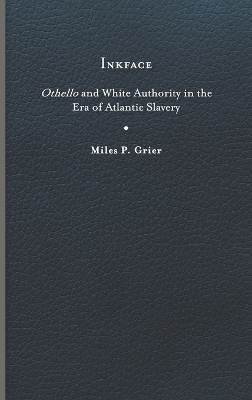
Inkface
Othello and White Authority in the Era of Atlantic Slavery
Seiten
2023
University of Virginia Press (Verlag)
978-0-8139-5036-5 (ISBN)
University of Virginia Press (Verlag)
978-0-8139-5036-5 (ISBN)
Traces productions of Shakespeare’s Othello from seventeenth-century London to the Metropolitan Opera in twenty-first-century New York. Miles Grier shows how the painted stage Moor and the wife whom he theatrically stains became necessary types, reduced to objects of interpretation for a presumed white male audience.
In Inkface, Miles P. Grier traces productions of Shakespeare's Othello from seventeenth-century London to the Metropolitan Opera in twenty-first-century New York. Grier shows how the painted stage Moor and the wife whom he theatrically stains became necessary types, reduced to objects of interpretation for a presumed white male audience. In an era of booming print production, popular urban theater, and increasing rates of literacy, the metaphor of Black skin as a readable, transferable ink became essential to a fraternity of literate white men who, by treating an elastic category of marked people as reading material, were able to assert authority over interpretation and, by extension, over the state, the family, and commerce. Inkface examines that fraternity’s reading of the world as well as the ways in which those excluded attempted to counteract it.
In Inkface, Miles P. Grier traces productions of Shakespeare's Othello from seventeenth-century London to the Metropolitan Opera in twenty-first-century New York. Grier shows how the painted stage Moor and the wife whom he theatrically stains became necessary types, reduced to objects of interpretation for a presumed white male audience. In an era of booming print production, popular urban theater, and increasing rates of literacy, the metaphor of Black skin as a readable, transferable ink became essential to a fraternity of literate white men who, by treating an elastic category of marked people as reading material, were able to assert authority over interpretation and, by extension, over the state, the family, and commerce. Inkface examines that fraternity’s reading of the world as well as the ways in which those excluded attempted to counteract it.
Miles P. Grier is Associate Professor of English at Queens College, City University of New York.
Introduction: The Residue of Inkface
1. The Moor of Venice Reconstructed
"O Bloody Period": Othello's Constitution and Significance
"Letter and Affection," or Iago's Motive Reconsidered
Interlude: Desdemona's Guilt, or "The Farce of Dead Alive"
2. "Be Thus When Thou Art Dead": Aphra Benh's Remediation of Othello
3. "Pale as thy Smock": Abigail Adams in Desdemona's Whites
4. The Cherokee Othello: Treating with 'The Base Indian'
5. Inkface to Chalkbones: The End of White Character Mastery in Melville's "BC"
Epilogue: An Ultimate Reader
| Erscheinungsdatum | 29.11.2023 |
|---|---|
| Reihe/Serie | Writing the Early Americas |
| Zusatzinfo | 16 illustrations |
| Verlagsort | Charlottesville |
| Sprache | englisch |
| Maße | 156 x 235 mm |
| Gewicht | 272 g |
| Themenwelt | Geisteswissenschaften ► Sprach- / Literaturwissenschaft ► Anglistik / Amerikanistik |
| Geisteswissenschaften ► Sprach- / Literaturwissenschaft ► Literaturgeschichte | |
| Geisteswissenschaften ► Sprach- / Literaturwissenschaft ► Literaturwissenschaft | |
| ISBN-10 | 0-8139-5036-8 / 0813950368 |
| ISBN-13 | 978-0-8139-5036-5 / 9780813950365 |
| Zustand | Neuware |
| Haben Sie eine Frage zum Produkt? |
Mehr entdecken
aus dem Bereich
aus dem Bereich
Poetik eines sozialen Urteils
Buch | Hardcover (2023)
De Gruyter (Verlag)
59,95 €
Entzauberung und Faszination des Immergleichen in Literatur und Film
Buch | Softcover (2024)
Springer Fachmedien Wiesbaden GmbH (Verlag)
84,99 €
Buch | Softcover (2024)
belleville (Verlag)
20,00 €


